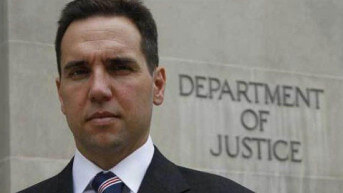For who knows which time, politics has abused the international judiciary to achieve a political goal in the Balkans. The publication of indictments against Thaci, Veseli and others, for crimes committed by the KLA (Kosovo Liberation Army) just three days before the meeting in Washington, undoubtedly undermined this branch of the Serbian-Albanian dialogue, delayed and slowed it down, but probably did not stop it. There is a lot of talk on that occasion about Thaci, Veseli, Haradinaj, Richard Grenell, but not about the man who pulled the trigger, aiming for the Washington meeting, from which much was expected.
His name is Jack Smith, he has been the chief prosecutor of the court for crimes committed by the KLA for two years, and his decision to publish the names of the accused (Thaci, Veseli…) created a political earthquake, which already leaves consequences on the Serbian-Albanian dialogue. Prosecutor Smith will certainly reject any objection that politics influenced his decision, but he will not be able to escape from such a “verdict” – neither in the Balkans, nor in the United States, nor even in Europe. His decision directly undermined the process in which the US presidential administration invested a lot – both time and reputation, effort, but also expectations. Not to mention how much the leaders in Belgrade and Pristina have invested in this process, and especially in the anticipated Washington conversation.
Jack Smith, therefore, made an unparalleled political move. And he spoke differently, not so long ago, in July 2014, when, as a senior US Department of Justice official, he testified before the US Congressional Committee on Public Administration Reform Control: “Career prosecutors, like me, must be isolated from political processes in order to conduct an objective, factual and non-political investigation. Our job is to enforce the law, regardless of politics. I have never met, nor would I tolerate, any politically motivated decision. Politics does not play, nor will it play any role in the work of us prosecutors.”
Apparently, something with Mr. Smith has changed in the meantime, so politics now plays an important role in his prosecutorial work. What other than politics when the indictments have existed since April 24, and you publish them two months later, before they are confirmed in court and a few days before the key political negotiations?
Whose policy influenced prosecutor Smith’s decisions will probably remain an open topic for a long time to come. The first “suspicions” fell on several addresses, both in the United States and in Europe. Undermining the Washington meeting, and thus the process led by Richard Grenell on behalf of President Trump, would suit their competitors in the country – the Democrats. Undoubtedly, they still have enough influence in the administration to be able to carry out such an operation, especially using their people and influence in international forums, such as the court for crimes committed by the KLA.
Suspicion also fell on Europeans, primarily on Germany as the most influential in the EU, where they do not hide dissatisfaction and a kind of jealousy that the Serbian-Albanian dialogue under American mediation is progressing incomparably faster than it did during many years of European participation. Regardless of the fact that since its founding in 2015, the chief prosecutor of the KLA court is American, the influence of Europeans on this judicial body is undeniable. Just as the former Tribunal for the Former Yugoslavia in The Hague has repeatedly been able to reverse the political situation with its decisions (especially by issuing and publishing indictments), why would a specialized court for KLA crimes be immune from that?
Whoever exerted political influence (not to mention pressure) on prosecutor Smith and his team, the effects of this operation are already visible and devastating. The US-mediated negotiation process has, to say the least, slowed down, if not temporarily delayed. It promised speed to reach a solution, with full cooperation of both sides, the Serbian and the Albanian. It is unlikely to be completely stopped, because the White House has already invested a lot in its success, but Washington will have to find a way to revive it very quickly, if they want to record an important success on the international scene before the November presidential election.
The slowing down of the American model, and especially its collapse, would bring satisfaction to Berlin, and especially to Moscow, which are essentially on the same line when it comes to resolving the Kosovo issue. They want it to last as long as possible, as far as Russia is concerned – forever, and in the case of Germany, the solution should be the recognition of Kosovo by Serbia, no matter how long it takes to reach such an outcome. Of course, the delay suits the Albanians as well, because they are counting on the return of the democratic administration in Washington, which would be in their favor and demand from Belgrade to recognize Kosovo within the existing borders. Procrastination does not suit Serbia, on the contrary. President Vučić, in addition to showing readiness for compromise and being the only one who has ever brought concrete initiatives to the table, often emphasizes that the solution must be found by the current Serbia and the current generation of its leaders, so as not to leave the Kosovo issue unresolved to their successors. It is a consolation that Belgrade is not a factor disturbing the dialogue now, just like during the year and a half of the trade blockade introduced by Pristina. Belgrade is ready, willing and determined to work on reaching a solution, it is not a factor that hinders the process. For the first time since we have been dealing with Kosovo. And that gives hope that it will be successful this time.
